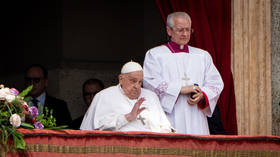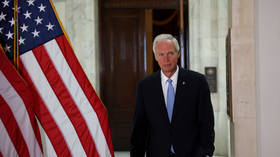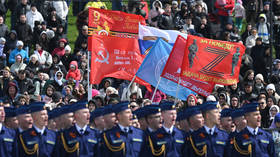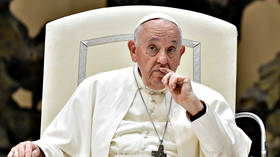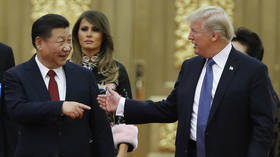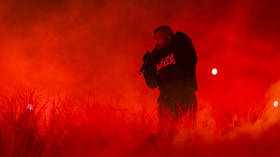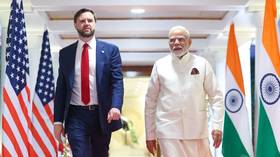Iran and Palestine tied up in Netanyahu’s Moscow talks
Israel has reportedly asked Russia to support “sanctions with teeth” in order to help deal with Iran's controversial nuclear program.
Israel's Prime Minister Benjamin Netanyahu has been discussing the Iranian problem with President Medvedev during his visit to Moscow. After the first day of talks there has been no official response from Russia yet.
The official story is that Benjamin Netanyahu has come to Russia to promote bilateral relations. Unofficially, it is thought that the real reason is whether or not Russia will support a fourth round of sanctions against Iran.
The Israeli Prime Minister was set to try to get Russia on Israel’s side on the issue of Iranian uranium. The Islamic Republic so far has remained unrepentant when it comes to its nuclear program. Just recently it claimed it is expanding it. Several days ago, Iranian President Mahmoud Ahmadinejad stated that his country is now capable of enriching uranium to up to 20 per cent, which is just a step from getting technology for reaching the 90 per cent enrichment level necessary for production of nuclear weapons.
Emily Landau from the Institute for National Security Studies in Tel-Aviv said the international community should impose, in Hillary Clinton’s terms, “crippling” sanctions on Iran to return Iran to serious negotiations.
“As long as Iran does not feel any pressure from the international community it has no reason to negotiate seriously because it is bent on achieving a military capability for the regional influence that it would gain thereby,” Landau told RT.
”Therefore, Iran’s calculation needs to be changed and sanctions, and other forms of pressure, have a role in changing their cost/benefit analysis of the status quo,” she said.
Benjamin Netanyahu may be demanding from Russia to ban nuclear co-operation with Iran by saying that the republic is not a reliable partner, in which Russia has so far remained unconvinced.
While Israel is pressing for tough sanctions against Iran, it is widely assumed that it itself is a nuclear power. Irina Zvyagelskaya, Vice President of the Center for Strategic and Political Studies calls it a “double standard”:
“International policy in general is a double standard policy, everybody knows it, but in case of Israel the main goal is to preserve their nuclear monopoly in the region. That is why Israel was against Iraqi attempts to create a nuclear reactor. And there are other indications that it’s very important for Israel to remain the lone nuclear power in the area.”
Russia has been backing Iran in its aspiration to peaceful nuclear energy.
What is more important, Russia has always been against the use of military force against Iran, while Washington does not rule out any course of action, much to the concern of Moscow.
“The US military have clearly outlined plans to strike Iran if necessary. The consequences could be terrible, not only for the Asian continent, but also for the whole of the international community. It is hard to predict what will come out of it,” says General Nikolay Makarov, Chief of the Russian Armed Forces General Staff.
Russia remains committed to relying on the IAEA, the International Atomic Energy Agency, which is the main authority for the nuclear energy in the world.
Moscow has repeatedly made it clear that it wants a diplomatic solution of the Iranian issue. However those voices supporting sanctions against Iran are only getting louder in Russia.
“Iran is definitely a very important issue, we’re definitely very much concerned about the recent developments there and my personal opinion as a Russian politician is that Russia should be stronger in its approach towards Iran and should support at least economic sanctions, though not military actions, against Iran,” said Konstantin Kosachev, the head of Russia’s State Duma Foreign Affairs Committee.
Meanwhile, the timing of Israeli Prime Minister’s visit to Moscow is really special because he has come to Moscow on the heels of Hamas leader Khaled Mashaal, who arrived in Moscow last Monday for discussions with Russian Foreign Minister Sergey Lavrov on a new plan for negotiations between Israeli and Palestinian leaders. Shortly before that, Palestinian leader Mahmoud Abbas visited Russia for talks with President Dmitry Medvedev.
The fact that all parties of the Middle East conflict chose Moscow demonstrates that Russia is becoming the major peace broker in the region, which the world is taking notice of. It shows that Russia is willing to engage all parties of the Middle East peace settlement, something the US has failed to do so far.
The Palestinian knot
The story line hasn’t changed much over the decades – Israel and the Palestinians as far apart as ever, despite the hands-on involvement of American presidents from Carter to Obama. But for all the peace summits and road-maps, none have got very far.
Trying to solve the Middle East peace process is an attractive goal for any world power. But it would seem that many American diplomats have perhaps overestimated the willingness of Arab countries to make concessions to Israel. And for Israel, in turn, to implement a complete freeze on Jewish settlements on disputed lands.
After the Soviet Union cut relations with Israel in 1967 following the Six Day War, Washington was left to control the game as it desired.
“Russia was too busy with domestic affairs and economic challenges to really perform an important role in negotiations here, and at the time the US felt very powerful as it won the Cold War and it didn’t want to share the glory of mediation and negotiation with other participants,” Professor Eytan Gilboa from Bar-Ilan University told RT.
Ghassan Khatib has spent most of his life campaigning for Palestinian-Israeli dialogue.
He was a delegate to the Madrid Conference in 1991 – which the US and Soviet Union jointly sponsored to try to break the deadlock – and attended talks in Washington that year.
He says the main reason for the lack of progress has been America’s bias towards Israel, which he believes works both ways, adding “I believe that Israel is selective in its international relations. They insist on a solo American role in the peace process because they are comfortable with the American approach to the peace process and they discourage others like Russia and Europe from taking part in international efforts and they try to encourage a relationship with Russia on other issues, such as the Iranian threat, because they believe Russia can play a role in this regard.”
That is precisely why many believe Israeli Prime Minister Binjamin Netanyahu is visiting Moscow.
He is expected to ask the Russian leadership to ban any weapons deals with Iran, and not to provide any nuclear know-how to Tehran.
In turn, his promise would be Israeli participation in any Russian-sponsored Middle East peace initiative.
Peter Stegney, Russian ambassador to Israel, said: “We are trying to help to reach direct dialogue between the sides because we believe that a comprehensive, viable and just solution might be reached in the framework of direct talks. The sides of the conflict have to decide what the terms of such an agreement are.”
Russia has dialogues with Israel’s foes – Hamas, Hezbollah and Iran – putting it in a unique position to act as go-between. But not everyone believes that that makes Moscow the ideal mediator.
“Iran and its allies are committed to preventing a settlement with Israel and Russia does not have the leverage on Iran to change that," notes Dr Jonathan Rynhold from Begin-Sadat centre for Strategic Studies.
As far back as several years ago, Moscow first proposed holding a Middle East conference involving all the parties to try to finally find peace.



